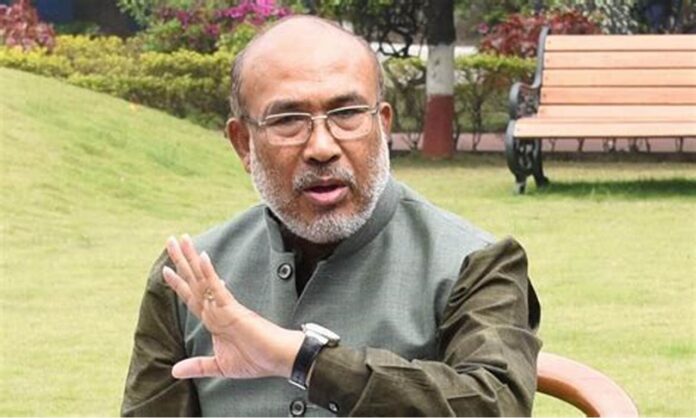Manipur Chief Minister N Biren Singh has launched a scathing criticism against Delhi Chief Minister Arvind Kejriwal for his comments regarding Prime Minister Narendra Modi’s age. Singh, while addressing the issue, deemed Kejriwal’s remarks as “pitiful” and “farcical.” This exchange of words adds yet another layer to the ongoing political discourse surrounding Prime Minister Modi’s leadership and the criticism directed at him from various quarters.
The spark for Singh’s criticism stemmed from Kejriwal’s recent statement where he expressed concerns over Prime Minister Modi’s age, implying that it could potentially impact his ability to govern effectively. Kejriwal’s remarks ignited a debate across political circles, with some viewing them as a legitimate concern about leadership capabilities and others criticizing them as unwarranted personal attacks.
In response, Manipur Chief Minister N Biren Singh minced no words in his rebuke of Kejriwal’s comments. Singh condemned Kejriwal’s remarks as “pitiful,” emphasizing the need for respectful dialogue in political discourse rather than resorting to personal attacks. He further characterized Kejriwal’s criticism as “farcical,” suggesting that it lacked substance and failed to address the real issues facing the country.
Singh’s critique of Kejriwal’s remarks reflects a broader trend in Indian politics, where leaders often engage in verbal sparring and mudslinging rather than focusing on substantive policy discussions. The exchange underscores the polarized nature of political discourse in the country, where personal attacks and character assassinations have become commonplace, detracting from the real issues at hand.
At the heart of the matter lies the question of leadership and governance, with Prime Minister Modi’s age being used as a focal point for criticism by some opposition leaders. While age may be a legitimate factor to consider in assessing leadership capabilities, critics argue that it should not be used as a pretext for launching personal attacks or questioning an individual’s fitness to govern.
Moreover, Singh’s defense of Prime Minister Modi’s leadership reflects the support he enjoys within the Bharatiya Janata Party (BJP) and the larger National Democratic Alliance (NDA) coalition. As a prominent BJP leader and Chief Minister of Manipur, Singh’s remarks carry weight within the party and serve to bolster Prime Minister Modi’s image amidst mounting criticism from opposition leaders.
However, Singh’s criticism of Kejriwal also highlights the broader issue of civility and decorum in political discourse. While healthy debate and disagreement are essential components of democracy, resorting to personal attacks and name-calling only serves to erode public trust in political institutions and leaders. Singh’s call for respectful dialogue underscores the importance of maintaining civility and dignity in political discourse, even in the face of ideological differences.
The exchange between Singh and Kejriwal also raises questions about the role of age in politics and governance. While some argue that advancing age may diminish a leader’s energy and effectiveness, others contend that experience and wisdom can be valuable assets in leadership roles. Ultimately, the assessment of leadership capabilities should be based on a comprehensive evaluation of an individual’s record, vision, and ability to deliver on promises rather than on age alone.
As political leaders continue to spar over issues of leadership and governance, it is essential to remember that the real test of leadership lies in the ability to address the pressing challenges facing the country and improve the lives of its citizens. Whether it is through constructive dialogue, meaningful policy reforms, or inclusive governance, leaders must demonstrate a commitment to serving the interests of the people and upholding the principles of democracy and accountability.
In addition, Manipur Chief Minister N Biren Singh’s criticism of Arvind Kejriwal’s remarks on Prime Minister Narendra Modi’s age underscores the polarized nature of political discourse in India. Singh’s defense of Prime Minister Modi’s leadership reflects the broader support he enjoys within the BJP and the NDA coalition, while also highlighting the need for civility and respect in political discourse. As the debate over leadership and governance continues, it is essential for political leaders to focus on substantive issues and engage in constructive dialogue that promotes the welfare and progress of the nation.




